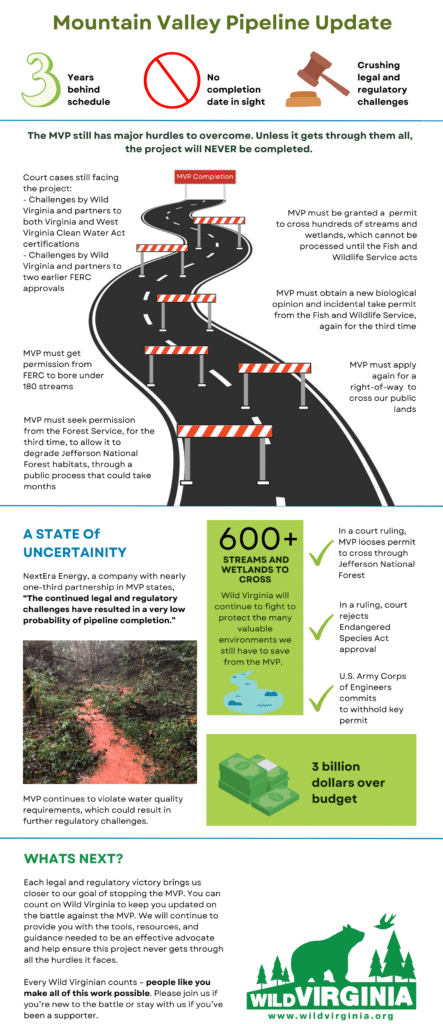WHAT ARE WE DOING ABOUT THE MOUNTAIN VALLEY PIPELINE?
Construction on the Mountain Valley Pipeline (MVP) began in early 2018. The builders have racked up hundreds of violations and damaged our waters and people along the project’s path. Still, we and thousands of allies have prevented the pipeline’s completion and continue the fight to stop it on all fronts.
In 2021, MVP seeks approvals to cross through or under hundreds of streams and wetlands. The Corps of Engineers is considering an application for a Clean Water Act permit to allow MVP to dig and blast through our waters. At the same time, the state of Virginia must certify that the proposal will meet all of our water quality standards before the Corps can allow construction.
The Federal Energy Regulatory Commission (FERC) is reviewing a proposal by MVP to bore under more than 180 waterbodies to evade other permitting requirements. MVP has not done the necessary study to show how this drilling will affect underground environments and water flows and we oppose this reckless scheme.
While the regulatory reviews go forward, we continue to challenging improper agency decisions in court. Lawsuits still to be heard in 2023 include:
- A challenge to decisions by the Forest Service and Bureau of Land Management that would allow the pipeline to cross the Jefferson National Forest.
- A suit asserting the U.S. Fish and Wildlife Service failed to properly assure protections of sensitive and valuable species, in accordance with its duties under the Endangered Species Act.
- Two challenges against FERC assert the Commission is improperly allowing work without all federal approvals and to continue a project that time has shown to be unneeded and destructive.
Latest Updates on the Mountain Valley Pipeline
Environmental advocates challenge FERC on MVP Southgate gas pipeline project, Feb 20, 2025 (NC News)
“The damage to our waters and our communities caused by the Mountain Valley Pipeline are an ugly predictor of the destruction the Southgate project will cause,” Wild Virginia conservation director David Sligh.
Virginia fines MVP for environmental violations, Mar 28, 2024 (WVTF)
“There’s no reason to think that a minimal fine is going to affect their behavior going forward,” said David Sligh. The pipeline is projected to cost $7.6 billion, and Sligh, who previously was an employee with DEQ, said $34,000 isn’t a very stiff fine for a company of that size.
Wild Virginia vows to fight on against the Mountain Valley Pipeline, August 14, 2023 (WVTF)
“They really can’t meet the environmental requirements that they’re faced with, and that should still be a basis for this project never being finished.” – Wild Virginia Conservation
Director David Sligh
Appeals court orders Mountain Valley Pipeline to halt construction again, July 11, 2023 (WDBJ7)
“Federal officials have not yet lived up to that basic requirement on this project and the courts have had to step in. Construction on this harmful project must be ended now.” – Wild Virginia Conservation
Director David Sligh
What’s next for the court cases challenging Mountain Valley Pipeline?, June 9, 2023 (Virginia Mercury)
Sligh said environmental groups are considering challenging the Fiscal Responsibility Act’s provision eliminating judicial review of agency approvals as a breach of the separation of powers clause.
Equitrans gas pipeline gets approval, but stock suffers, April 13, 2023 (Pittsburgh Business Times)
Wild Virginia Conservation Director David Sligh said MVP “should finally abandon this project and begin all possible efforts to heal the wounds they’ve already inflicted on our land, water and people.”

YOU CAN HELP DEFEAT MVP!
Whether you’ve already been active in the Mountain Valley Pipeline opposition movement or not, now is the time to push even harder to stop the project. We can prevent degradation of our precious public lands, further endangerment of rare species, and pollution and habitat destruction in our waters.
3 simple steps to Mountain Valley Pipeline Opposition:
- Make sure you follow our updates and keep informed about what’s happening. Tell your friends, neighbors, and family to do the same.
- Submit comments to let decision-makers know of your interests and concerns. We will give you alerts about how and when to comment, and guidance on what you can say to have an impact.
- Support Wild Virginia’s efforts through your membership and support.
You make it possible for us to continue this work and the results are clear – we all defeated the Atlantic Coast Pipeline (ACP) in July 2020 and MVP is now at least three years behind schedule. Industry analysts now admit that MVP may never be completed and we intend to make those predictions a reality.
CURRENT POLICY RECOMMENDATIONS
New fossil fuel infrastructure should not be pursued as we work towards our clean energy goals in Virginia. We have learned from projects like the Mountain Valley Pipeline that current laws and regulations do not adequately protect water resources, public health, or the environment from the construction of new fossil fuel infrastructure. MVP’s violations highlight the dangers of construction in fragile karst landscapes and through seismic zones and reinforce the need for agencies to hear from local communities about the realworld impacts they experience from pipeline construction. Absent a ban, any new fossil fuel build-out, including both interstate and intrastate pipelines, must
be thoroughly and holistically scrutinized through processes that fully engage and respect the public’s views and interests. Fossil fuel projects should receive a comprehensive review, including cumulative health and environmental impacts on nearby communities. For projects already in process, enforcement of pollution laws must be prioritized, and companies must be held fully accountable, regardless of project completion or abandonment. Review processes should include bonding requirements for appropriate funding or
insurance coverage, and include stringent environmental restoration requirements.
The above paragraph in pink is from the Virginia Conservation Network. Download the full policy briefing: Our Common Agenda.
